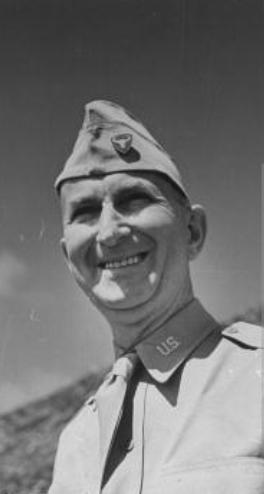George Marshall Parker, Jr. was born on April 17, 1889, in Sac City, Sac County, Iowa. He was the son of George Marshall Parker and Louisa Pohlman VanDerveer Parker. He was the husband of Dorothy Cooper Parker.
George was a military figure who commanded the Philippine II Corps during the Battle of Bataan. He joined the army as a young infantry Lieutenant in 1910, working first as an officer in the Philippines, attending the National War College, as a consultant in Panama, and as an aid to Governor Guy Park. While commanding the 7th Infantry Regiment as a Colonel in 1940, he was promoted by President Roosevelt to Brigadier General and appointed to overseas command in the Philippines due to his experience in the area in the early 1900s.
By 1941, the threat of the Japanese invasion had grown to such an extent that General Macarthur appointed his commanders to specific defense positions in preparation for the potential invasion. Now Major General Parker would be left in charge of the Southern Luzon Force. However, on December 23rd, the situation had become critical in an area known as the Bataan Peninsula. General Parker was forced to adapt to General Macarthur's new war plan and quickly retreat his forces to Bataan. Holding the rice paddies and hills surrounding the roads to Manila, Parker was forced to fight to the death with his newly formed Philippine Second Corps. One newspaper reports a Japanese attack on his headquarters where the suicidal soldiers charged machine guns with metal chest plates. These devices worked, and the Japanese managed to jump into several Filipino nests. However, the defenders of Bataan were skilled experts, and each Jap that reached a nest was quickly bayoneted. Eventually, after four months of holding out, Major General King surrendered Bataan in April 1942. While the surrender was made in order to save the drastic amount of lives being lost to malaria and combat, the ensuing event for which Bataan was known is what followed, and life became hell for these men. Forced to march over sixty-five miles, several thousand POWS died in the Bataan death march to their various prisoner camps. Even those who did not die in the march would die years later in the camps. General Parker was taken POW and his mother would pass away before ever knowing if her son was dead or alive. Being held for over three years, General Parker would eventually be liberated by the Russians and would return home to his wife in 1945. At the time of his capture, he was 53.
General Parker retired from the Army on September 30, 1946. He moved to Oregon and died at a nursing home in Portland. He was interred at the Mount Crest Abbey Mausoleum in Salem, Oregon, on October 25, 1968.
Source of information: www.findagrave.com, en.wikipedia.org

